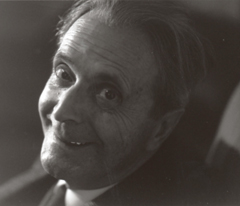Just say I need You
We are commemorating the birthday of Igino Giordani (24 September 1894) with some excerpts from his diary, written through the years
24 September 1948
Lord, I don’t have to cite the list of my needs, which are infinite. I just have to say that I need You.
from Igino Giordani, Diary of fire, New City, 1980, p. 53
24 September 1963
Sixty-nine years: a goal which I reached without my noticing it. I had expected so many things, and the fruits gathered are those I had targeted. Evidently I dug and pruned, causing damages; the divine Farmer corrected and revived.
And He brought me the fruit of solitude: in terms of silence and quiet to converse with Him, and be with Him. People have detached themselves for human reasons, but at every detachment, He came closer. Now we are He and I: the All and nothingness; Love and the Loved one. And the dialogue is not disturbed by the clangour of friends or clients. And so, if I return amidst humans, it is to love them without presuming I would be loved in return. It is to serve them, without expecting to be served, not even by the closest ones by nature and super-nature: so close and so distant! Due to this, what appeared to be an abandonment by man, resulted in a rediscovery of God – and in Him are also the angels and saints, from Mary to the last man who died in grace. It seemed like a crash and instead it was an elevation to heaven, a liberation instead of dispersion.
The Enemy directed a gloomy aggression against me, showing me with a red luminosity, the ingratitude and abandonment of the people I loved and served. But I don’t want this evidence to bog me down, and paralyse me; if I stopped, it would grow like an atomic bomb.
What is ingratitude, or the evil of four, ten, or a hundred people, in the face of the constant love of God, to the ever new poetry of Mary, the protection of the saints and their communion? Let your soul lose itself in the joy and love that does not set, that one cannot see but feel. It does not promise but maintains: losing oneself in grandness instead of misery, in the light instead of shadows, and in heaven instead of the earth.
My spiritual problems melt away if I examine them in the morning, in a transparent light of humility. In it I see that in the Marian clarity, huge shadows of pride, tantrums, and vanity dissolve like fog in the joyful morning air.
At times it seems that the old man, our ego, is decisively dead. Instead it dies three days after our natural death.
So one day the new man renounces grandeur, friendships, and vanities: the next day the old man rises from the arcosolium to shed tears on the loss of honours, privileges and friendships.
And instead, if it is worthwhile to take the proclaimed commitment before Jesus in the Eucharist on the day of the Immaculate, I consecrated myself to God: that is, as a man of the world who no longer exists. My will, my sentiment is the sentiment of my Superiors. If they put me aside and treat me badly, they do so for my good. The more I climb towards God, the more I shall have less esteem from the world. Making the old man die means occupying the last position, and remaining hidden, in silence. Obedience, penitence and humility: the three components of the life God has assigned to me.
from Igino Giordani, Diary of fire, New City, 1980, p. 121-122




